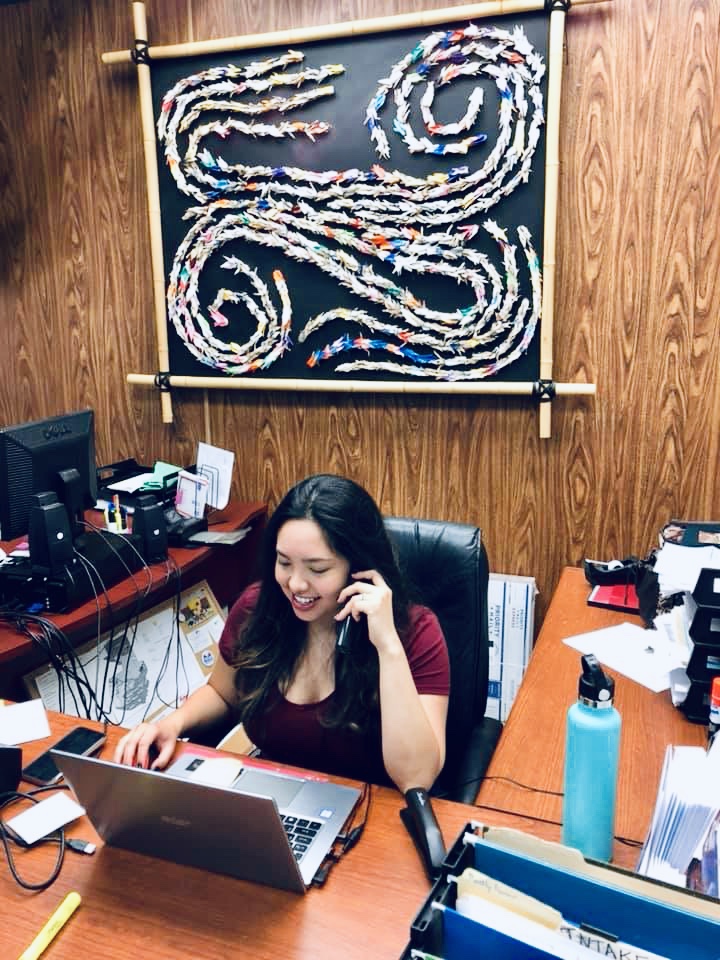
Rossana Joo
 Rossana Joo has always sought out great opportunities. Along the path that brought her back and forth between her home in Lima, Peru and her new home in St. Louis, Joo found a professional and further personal enjoyment in helping others.
Rossana Joo has always sought out great opportunities. Along the path that brought her back and forth between her home in Lima, Peru and her new home in St. Louis, Joo found a professional and further personal enjoyment in helping others.
Right after finishing high school in Lima, Peru, Rossana Joo moved to St. Louis to be with her older sister and to attend college in the United States. Her sister had moved to St. Louis almost 6 years earlier with her husband, a Marine originally from St. Louis, and provided a place for her sister in the US where her protective parents would not have to worry about her. Not only did Joo’s sister provide her with a home and a sense of family in the US, she also acted as her college guidance counselor. Today, Joo reflects on and appreciates the help her sister offered as she was getting adjusted to living in a new city, “I guess at that time I was just concerned about getting here and not really worried about what I want, where I want to go. I knew there were a lot of options and it just seemed so overwhelming.”
Joo soon became familiar with the learning process that many American college freshmen experience. She started at Fontbonne University when she was just 17, and later transferred to Maryville University after her first year to study business administration and management. Still, Joo felt that she could do more, and started testing out other courses. “I liked my business classes but I wanted to learn something I didn’t think I would learn in life later as well. I wanted to try something else because this was the best time for that.” She discovered that Maryville offered a minor in International Studies and soon became excited about the courses and opportunities she would have.

One such opportunity was a required semester of study outside of the United States. Joo remarks that she was thrilled at the chance to experience new places and travel. Yet, with the restrictions accompanying her student visa, along with concerns from her parents, Joo decided a more practical option was to use that time to go back and live in Lima as a visiting student, instead of a permanent resident. “I took a semester in Peru and went back to Lima. Although I had been hoping to go somewhere new, it was also a different experience for me and I have no complaints.” Joo states she particularly noticed differences between the two countries in teaching style and methods, which reinforced her confidence and assurance that moving to the US to study was the right path for her.
Back in St. Louis, Joo remembers her first jolting cultural switch and the time it took to grow accustomed to American culture and her new atmosphere. Having taken English speaking courses before, Joo says it took her a few months to become comfortable hearing English constantly, and felt slightly overwhelmed with her coursework during her first semester. “I remember assignments with reading difficult material especially were challenging, and I got frustrated. I thought I just needed to go back. But I told myself it would get easier and it did get much better.” Outside of her academics, Joo says that she had to make adjustments in her social life as well and additionally got used to driving longer distances more often than she ever had in Lima. Joo also grew up along with her transition to the US and her experience in college. Living with her sister, Joo felt the need to take on more responsibilities and contribute to housework more than she had done as the youngest child back home in Lima.
As her time at Maryville approached an end, Joo had already begun searching for a job in St. Louis, but expressed that her student visa status made the process difficult and frustrating: “I was looking for a job and I realized that it was not going anywhere. I didn’t want to waste my time here not doing anything after I graduated, so I decided to go home to Peru.” Joo, although similarly qualified and attaining a degree from a United States’ university, understood that it was her future need for sponsorship by a company which likely inhibited her ability to find employment - especially employment which offered her opportunity for professional growth. After graduation, Joo moved back to Lima with her parents and waited another 2 years to receive a green card before she returned to St. Louis and resumed her job search.

Joo had previously worked as an administrative assistant back in Peru, and started off in a retail position once back in the US. Not long after she was back, she was approached and asked to start at CitiBank as a mortgage loan officer. “I’d never thought about doing mortgages, but I really enjoyed that and I think my favorite part about it was that most of my clients were Spanish speaking. It was so nice to be able to use my Spanish at work to help people.” Joo explained how she was able to connect with her clients, mostly based in California, better than her non-Spanish speaking co-workers who needed the help of interpreters during their conversations. “I think instantly people feel a connection when someone is speaking their native language, whereas interpreters can be kind of awkward and then the client actually feels closer with the interpreter than the loan officer. People are always more comfortable when they can speak directly with someone, and you don’t have any problems with communication.” After different management shifts in the company, Joo decided to take some personal time to refocus her life at home and reinvigorate the drive for what professional goals she wanted to accomplish. Eventually, an old colleague requested her to transfer to PNC with him to continue managing mortgage cases there. Even though she was given more flexibility with her schedule, Joo found that her client base changed significantly. “In PNC I was working locally, so I didn’t have all the same types of clients in St. Louis because the Hispanic community here is not as large as in California. The work was still good but I missed that connection and providing that unique kind of assistance for people, being able to go the extra mile for them to make sure they felt comfortable.”

After working at PNC for about three years, Joo took some more time off while she could look for work she felt she could dedicate her whole self to, including her ability to speak Spanish. A few months into her break, Joo found a job listing as a bilingual legal assistant at the Migrant and Immigrant Community Action (MICA) Project. “It was rare for me to get excited about a specific job, but this was the one where I knew I would enjoy it 100%.” MICA, founded by Washington University St. Louis (WashU) law students Nicole Cortes and Jessica Mayo in 2011, was created with the intent to address the surplus of need for legal information and services to immigrant communities. Facing an abundance of cases to take on in the bi-state area, Joo acts as the first contact that people have with the organization, receiving requests, information for cases and directing individuals to the different resources most relevant to fit their needs. Without a background in legal work, Joo remarks that she has experienced an exponential learning curve as she is constantly encountering new questions and situations.

Most importantly, with MICA servicing a client base that is largely Hispanic, but also African and Asian as well as other nationalities, Joo has copious opportunities to utilize her bilingualism in a way that is meaningful and impactful for the lives of others. “This work, these situations are not something people do on a daily basis. So educating them a little bit more about the process is just a small thing, and it means even more to be able to represent them, be that support in a real way. Because on top of not being able to understand the process, its something completely new.” Joo remembers having a fairly simple process to follow to obtain her green card - and was additionally aided by her mother and sister. Now, she always does her best to focus all her effort into making clients comfortable and at ease with the wave of new information they face, as the entire MICA team strives to. Differently from her other positions, Joo notes how rewarding it feels to be surrounded by compassionate people in an environment that aims to always go the extra mile for an immigrant, largely bilingual, community.
Although Joo still enjoys traveling and finding new adventures, she has found a comfortable and content life in St. Louis as she has gotten to know some of its gems. Joo desires, similarly with the missions of MICA and the St. Louis Mosaic project, an advancement of the immigrant and foreign born population and the creation of more chances to grow the international community. Joo hopes for a greater and more obvious diversity to enter St. Louis where communities of all cultures will not simply be accepted and encouraged, but where a spectrum of nationalities, skin colors, religions, and cultural traditions becomes the new expected social norm.
Interviewed and written by Julia Cogan
